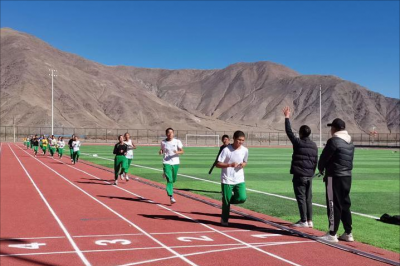| March 16,2017--At this year's "Two Sessions", representatives to the Natioanl People's Congress (NPC) from Xinjiang and Tibet said the "Belt & Road" Initiative has expanded the vision of residents in remote and poverty-stricken regions and is bringing the northwestern region of the country into a well-off society along with the rest of China.
“Trading between Xinjiang and central Asia are busier than ever. As long as we have good products, we never have to worry about sales." said Yang Qin, a representative from Xinjiang to the 12th NPC. As the chairman of a fruit products cooperative in Manas County of Changji Prefecture in Xinjiang, she has benefited from the opportunities provided by the "Belt & Road" Initiative to residents in border regions.
“The cooperative members have reaped the rewards of cross-border trading. This year, we have brought in new species of specialty mushrooms and are trying to expand production. We're hoping to break into the international market by the end of the year," she said.
As the freight transportation hub between China and Europe, Xinjiang attracts more and more people and products coming from the rest of the world.
“Habib Bank Limited of Pakistan and the German biochem group BASF have both settled in Xinjiang, while domestic companies like TBEA Co. and Guanghui Industry Co. have settled in Kazakhstan and Pakistan. The 'Belt &Road' Initiative has brought great energy to the economy of Xinjiang," said Hai Liman, a member of the National Committee of the Chinese People's Political Consultative Conference.
At the same time, construction for transportation, irrigation, energy, and other infrastructure in Tibet have accelerated thanks to the"Belt & Road" Initiative.
Tibet is now becoming the relay point between China and South Asia. There is a nonstop stream of merchants incoming from India, Nepal, and other countries, and trading is becoming more and more robust.
Gu Long, a Nepalese businessman who frequents China for business, opened an import/export company and a Nepalese boutique store in Gyirong Port of Tibet. With the rapid growth of China-Nepal trading in the past two years, his business has also taken off and is earning 450 thousand Yuan (65 thousand US dollars) annually.
“There are about eight thousand kinds of Nepalese products being sent to and sold in southwest China's Tibet every year. I believe that as the advancement of the "Belt & Road" Initiative and construction of the "Channel of South Asia", more and more Tibetan and Nepalese business owners will benefit," said Gu Long.
|
- Home
- News Tibet |Exclusive |China |World |Related News |Latest
- Documents White Papers |Others
- Photo Politics |Economy & Society |Culture & Religion |Human & Nature |Beautiful Tibet |Other Tibetan-Inhabited Area |Exchanges |Related
- Video News |Documentary |Micro-Video |Entertainment
- Art
- Tourism
- In Focus
- About Tibet






